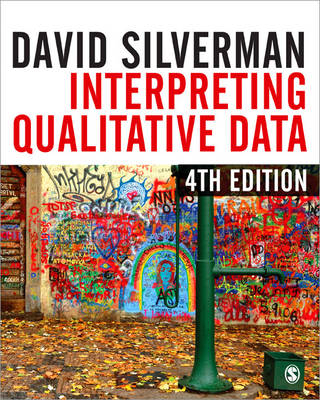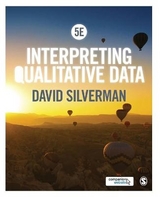
Interpreting Qualitative Data
SAGE Publications Ltd (Verlag)
978-0-85702-421-3 (ISBN)
- Titel erscheint in neuer Auflage
- Artikel merken
This is the perfect book for any student new to qualitative research. In this exciting and major updating of his bestselling, benchmark text, David Silverman walks the reader through the basics of gathering and analysing qualitative data.
David Silverman offers beginners unrivalled hands-on guidance necessary to get the best out of a research methods course or an undergraduate research project.
New to the fourth edition:
-A new chapter on data analysis dealing with grounded theory, discourse analysis and narrative analysis
-Further worked-through examples of different kinds of data and how to interpret them
-A separate section on focus groups and interpreting focus group data
-An expanded ethics chapter
-More coverage of digital media and photographs as data
-A companion website with additional case studies and examples, links to SAGE journals online, and links to useful websites, podcasts and Youtube videos.
This fourth edition is also accompanied with its own group page on www.methodspace.com where users can give feedback and discuss research issues.Visit www.methodspace.com/group/silverman
David Silverman trained as a sociologist at the London School of Economics and the University of California, Los Angeles. He taught for 32 years at Goldsmiths, University of London, where he is now Emeritus Professor in the Sociology Department as well as Visiting Professor in the Business Schools, King’s College, London, Leeds University and University of Technology Sydney and Adjunct Professor, Faculty of Education, Queensland University of Technology. He is interested in conversation and discourse analysis and he has researched medical consultations, shelters for homeless people and HIV-test counselling. He is the author of Doing Qualitative Research (sixth edition, 2022) and A Very Short, Fairly Interesting, Reasonably Cheap Book about Qualitative Research (second edition, 2013c). He is the editor of Qualitative Research (fifth edition, 2021) and the Sage series Introducing Qualitative Methods. In recent years, he has offered short, hands-on workshops in qualitative research for universities in Europe, Asia, Africa and Australia. Now retired from full-time work, he aims to watch 100 days of county cricket a year. He also enjoys spending time with his grandchildren and great-grandsons as well as voluntary work in an old people’s home where he chats and sings with residents.
PART ONE: THEORY AND METHOD IN QUALITATIVE RESEARCH
What Is Qualitative Research?
In Search of a Working Definition
Loaded Evaluations of Research Methods
Methods Should Fit Your Research Question
The Good Sense of Quantitative Research
The Nonsense of Quantitative Research
The Good Sense of Qualitative Research
The Nonsense of Qualitative Research
Varieties of Qualitative Research
Designing a Research Project
Selecting a Topic
Formulating a Researchable Question
Fitting your Research Question into an Appropriate Theory
Choosing an Effective Research Design
An Effective Literature Review
Basic Terms in Research Design
Conclusions
Data Analysis
Some Rules for Data Analysis
Content Analysis
Grounded Theory
Narrative Analysis
Conclusion
Research Ethics
Ethical Pitfalls
Ethical Safeguards
Some Ethical Complications
PART TWO: METHODS
Ethnography and Observation
The Ethnographic Focus
Methodological Issues
The Theoretical Character of Ethnographic Observations
Conclusion: The Unity of the Ethnographic Project
Interviews
What Is an ′Open-Ended′ Interview?
Why Interview?
Implications: Three Versions of Interview Data
Positivism
Emotionalism
Constructionism
Adolescent Cultures: Combining ′What′ and ′How′ Questions
Moral Tales of Parenthood
The Three Models: A Summary
Summary: Basic Issues
Three Practical Questions - and Answers
Conclusion
Focus Groups
What Are Focus Groups?
Analysing Focus Group Data in Social Science
Form or Substance?
Concluding Comments
Texts
Structure of This Chapter
Comparative Keyword Analysis (CKA)
Ethnography
Ethnomethodology: Membership Categorisation Analysis
Conclusion
Naturally-Occurring Talk
Why Work with Tapes?
Transcribing Audiotapes
Why Talk Matters
Conversation Analysis
Discourse Analysis
Conversation Analysis and Discourse Analysis Compared
Conclusion
Visual Images
Kinds of Visual Data
Research Strategies
Content Analysis
Semiotics
Workplace Studies
Conclusion
PART THREE: RESEARCH PRACTICE
Credible Qualitative Research
Does Credibility Matter?
Reliability
Validity
Generalisability
Conclusions
Writing Your Report
Beginnings
Your Literature Review
Your Methodology Section
Writing Up Your Data
Your Final Section
A Short Note on Plagiarism
Self-Expression or Argument?
PART FOUR: IMPLICATIONS
The Relevance of Qualitative Research
Three Roles for the Social Scientist
The Audiences for Qualitative Research
The Contribution of Qualitative Social Science
Summary
Conclusion
The Potential of Qualitative Research: Eight Reminders
Take Advantage of Naturally Occurring Data
Avoid Treating the Actor′s Point of View as an Explanation
Study the Interrelationships Between Elements
Attempt Theoretically Fertile Research
Address Wider Audiences
Begin With ′How′ Questions; Then Ask ′Why?′
Study ′Hyphenated′ Phenomena
Treat Qualitative Research as Different from Journalism
Concluding Remarks
| Erscheint lt. Verlag | 1.11.2011 |
|---|---|
| Verlagsort | London |
| Sprache | englisch |
| Maße | 186 x 232 mm |
| Gewicht | 950 g |
| Themenwelt | Sozialwissenschaften ► Soziologie ► Empirische Sozialforschung |
| ISBN-10 | 0-85702-421-3 / 0857024213 |
| ISBN-13 | 978-0-85702-421-3 / 9780857024213 |
| Zustand | Neuware |
| Haben Sie eine Frage zum Produkt? |
aus dem Bereich



